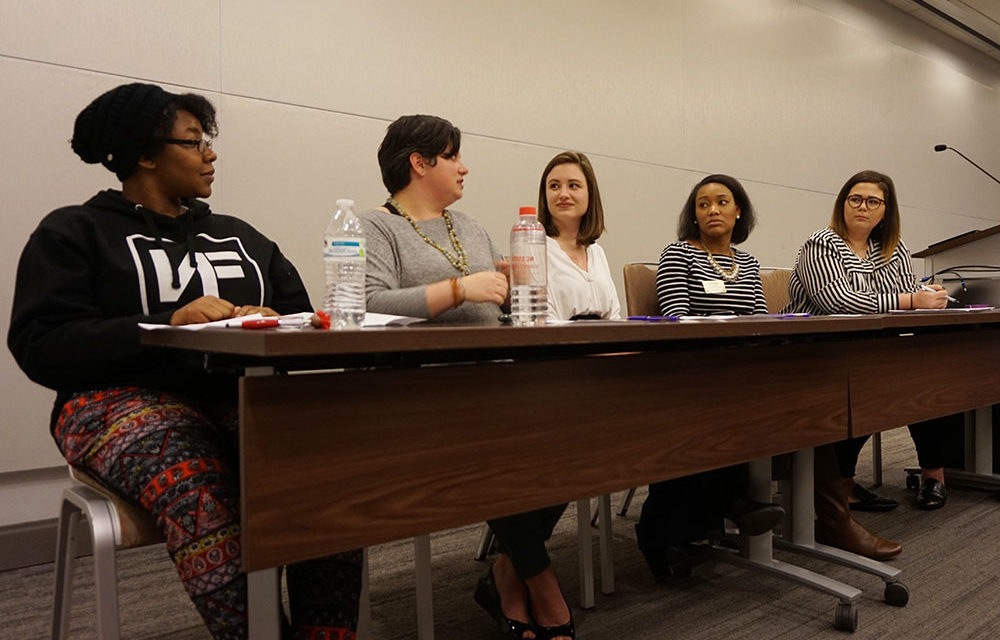Kennysha Woods/Nubian Message
Panelists discussed the documentary “The Illusionists” on Feb. 27 in Talley Student Union.
Kennysha Woods | Managing Editor
In observance of National Eating Disorders Awareness Week, the Women’s Center, Student Health Services and Counseling Center hosted a screening and discussion of “The Illusionists” (dir. Elena Rossini, 2015), a documentary that examines the relationship between the media, capitalism, beauty and self-image from a global perspective. The event took place on Feb. 27 in Talley Student Union.
Ashley Pinet, co-chair of the Eating Disorder Treatment Team at Student Health Services, began the screening with a preface about eating disorders. “[Eating disorders] do not discriminate and affect individuals of all shapes, sizes, colors and socioeconomic backgrounds.”
Pinet continued: “About 25 percent of college students engage in some form of disordered eating and many more suffer from a decreased sense of self-worth related to negative body image.”
“The Illusionists” exposes how many industries instill poor self-image and self-hatred in people and exploit their insecurities to sell products. These industries include those like skin whitening products, weight loss products and cosmetic surgeries, which all promote the Western idea of beauty as the standard.
Jean Kilbourne, a writer and activist with prominent work about the portrayal of women in advertising, is featured in the film.
“It often seems to me,” Kilborne says, “that a person who feels happy and secure isn’t going to be a very good consumer, because that person isn’t going to be looking for products to sure up the self-image or to feel better about oneself.”
The film shows how this is a problem that extends beyond US borders. Interviews from activists, psychiatrists, artists, researchers and other professionals examine Western influences on beauty in their own countries, like Japan and Lebanon.
They also show that this problem of media-induced insecurity is becoming increasingly problematic for men and children, with more and more advertisements and other media forms targeting definitions of masculinity and presenting children in overtly sexual contexts.
The panel discussion that followed talked about issues raised in the film, as well as topics relating to body positivity, activism, nonbinary identities and mental health.
Those on the panel included Wynter Adams, a third-year studying fisheries, wildlife and conservation; Harper Bell, a third-year studying social work; Cherrelle Davis, a clinical director at Veritas Collaborative in Durham, NC; Kat Kirby, the moderator and a fourth-year studying interdisciplinary studies; and Emily Law, a PhD candidate and instructor in the Wilson College of Textiles.
“Coming from the fashion perspective,” Law said, “in the fashion ads and things you see, there’s the illusion of the perfect body that people try to attain, and that’s something so prevalent in our media. In reality, even the people we idolize don’t think they have a perfect body.”
The panelists also pointed out gaps in the film. Adams and Davis commented on the exclusion of groups like elderly people and the LGBTQ+ community.
“The film is very binary,” Davis said. “It’s a film about women and men but there are a lot of people in between and nonbinary. They didn’t do a good job of talking about their bodies.”
Davis added: “I also think it really highlighted the thin ideal, but we live in a culture and society right now where it’s a thin waist, big boobs and a big butt. I think there was a missed opportunity in talking about that type of body.”
The panelists suggested ways to navigate and survive in a society that capitalizes on one’s poor self-image.
“My biggest thing, and what I preach to my friends,” Law said, “is to stop consuming the image that makes you feel bad about yourself… Don’t consume the perfect body, the perfect face and the perfect skin. Don’t idolize it. For your own health, try to consume more real things, real people—people finding values in themselves besides beauty.”
Bell said it’s also important to share resources with others and to normalize the acknowledgement of nonphysical qualities in yourself and others.
“It sounds a little silly,” Bell said, “but it’s ingrained. ‘Do I know how to give and receive compliments that aren’t based on physicality and fitting into a mold?’”





